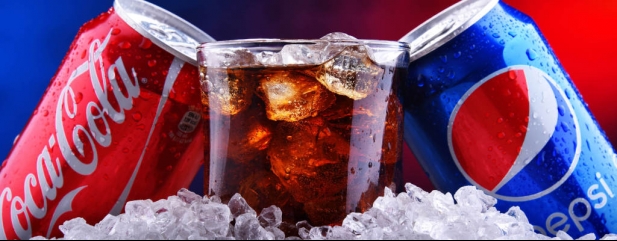Archived article
Please note that tax, investment, pension and ISA rules can change and the information and any views contained in this article may now be inaccurate.
Taste test: is Coke or Pepsi best for your share portfolio?

Is Coke or Pepsi the better investment? It’s question that investors have grappled with for decades. Celebrity icons like Madonna, Michael Jackson and Prince may have been replaced the likes of David Beckham, Cardi B and Will.i.am but investors will trade cool for cash all day long.
The Coca-Cola Company and PepsiCo share similar market valuations (about $260 billion to $233 billion), trade on similar price to earnings multiples (27 versus 31) and offer similar income credentials.
Their stock prices imply a 2.8% and 2.5% 2022 dividend yield respectively, and both are ‘Dividend Aristocrats’, meaning they have increased shareholder payouts every year for more than 25 years – PepsiCo for almost 50 years straight, Coca-Cola for nearly 60 years.
Both are supported by big fund groups such as BlackRock and Fidelity, while the fact that investment platform provider Charles Schwab is among the top 10 owners on both share registers suggests heavy backing from retail investors who are its clients and the ultimate shareholders of the beverage companies.
Perhaps Warren Buffett is one useful way of separating the fizzy drinks giants. His investment vehicle Berkshire Hathaway remains Coca-Cola’s largest investor as well as the drinks firm being Warren Buffett’s longest-held stock position.
Coca-Cola has provided some of Buffett’s best returns, with the stock up over 2,000% since he started buying it 33 years ago. Since the end of the global financial crisis Coca-Cola’s shares have rallied more than 180% and the shares have averaged a total return of 8.15% a year over the past decade according to Morningstar data.
Yet PepsiCo has been no slouch for investors either, its stock up 199% since the big market crash of 2008/09, and 10-year annualised total returns running at 12.1%.
Between them the two soft drink giants control 68% of the US carbonated beverages industry, yet Coca-Cola’s 43.7% share is nearly double PepsiCo’s 24.1%. In terms of perception, Coca-Cola appears to win hands down with roughly two of out of every three people who enjoy fizzy cola seeming to prefer this brand.
WHY PEPSICO HAS OUTPERFORMED
In turbulent markets, many investors have turned to dividend-paying market stalwarts like Coca-Cola and PepsiCo, and the two years since Covid-19 emerged has certainly been rocky.
However, PepsiCo has outperformed in recent years for two reasons:
A cheaper valuation. While this may not be the case in PE (price to earnings) terms now, PepsiCo is still valued at less than half Coca-Cola’s price to sales, 2.9-times against 6.6, based on 2021 figures.
Better dividend growth. Over the past five years, PepsiCo has raised its dividend by an average of 9.8% per year. Coca-Cola has raised its dividend by an average of 5.6% a year during that time.
As for growth, Coca-Cola’s organic revenue increased 9% in the fourth quarter to 31 December 2021, driven by a 10% increase in prices. That’s valuable pricing power. Organic revenue at PepsiCo rose 11.9% with a 7% increase in prices. Organic revenue strips out one-offs like acquisitions and asset sales.
However, both are feeling the pinch of rising costs as inflationary pressures squeeze profits. The cost of distribution, agricultural commodities and packaging have all risen, dragging on operating income.
This fell 28% in the last quarter for Coca-Cola, while PepsiCo’s operating profit fell 9%. Still, the results published for both companies on 10 February were better than analysts had forecast.
What is also interesting is that both hope to invest their way out of recent profit doldrums. Coca-Cola and PepsiCo are already two of the world’s biggest advertisers, yet both ramped up marketing spend during the most recent quarter.
Coca-Cola has gone long on the Winter Olympics, with a big Olympic themed campaign in China. Pepsi boosted marketing in the quarter around the National Football League ahead of the Super Bowl which was held on 13 February.
There is very little to separate Coca-Cola and PepsiCo shares; both look like great buy and hold stocks for investors willing to sit tight for several years.
Warren Buffett backs Coca-Cola, and while it had the better operating margins in 2021 (28.8% versus 14.7%) this is perhaps an area of opportunity for PepsiCo to make its business more cost efficient. PepsiCo also has the better return on investment and equity of 12.4% and 51.7% respectively versus Coca-Cola’s 10.4% and 46.2%.

Important information:
These articles are provided by Shares magazine which is published by AJ Bell Media, a part of AJ Bell. Shares is not written by AJ Bell.
Shares is provided for your general information and use and is not a personal recommendation to invest. It is not intended to be relied upon by you in making or not making any investment decisions. The investments referred to in these articles will not be suitable for all investors. If in doubt please seek appropriate independent financial advice.
Investors acting on the information in these articles do so at their own risk and AJ Bell Media and its staff do not accept liability for losses suffered by investors as a result of their investment decisions.

 magazine
magazine








